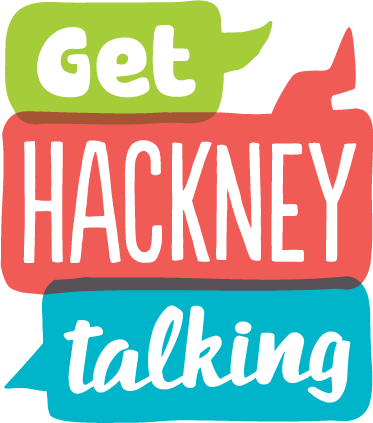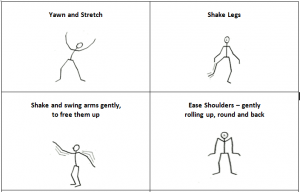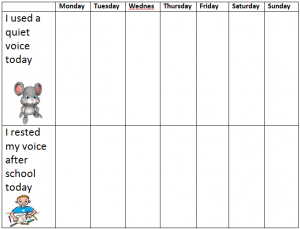What does ‘Voice’ mean?
Voice difficulties can present in a range of different ways such as:
- Quality of the voice e.g. overly creaky or hoarse
- Pitch range and control of the voice
- Vocal loudness levels
- Rate of speech e.g. too fast or slow.
- Resonance of the voice.
- Breath control
Strategies for supporting Voice difficulties
Avoid….
- Shouting and using a loud voice – Lots of background noise can make it difficult for our voice to be heard. Reduce background noise at home where possible e.g. wind the windows up in the car, turn the radio down to a level where you and your children can speak quietly and still be heard. Encourage your child to move away from the noise and nearer to the person they are speaking to instead. Prompt your child to move to the other room instead of calling out to the person in the other room or upstairs. Aim to be face to face when speaking to each other.
- Coughing or throat clearing – this may be a habit, but can make the problem worse. Encourage them to sip some water instead or do a hard swallow.
- Encourage your child not to imitate noises- children often imitate sounds during their play like car and plane engines, sirens and screeching brakes or robot or dinosaur noises. Too much of this can harm the voice box. Show your child that they can produce air to make other sounds e.g. ‘shhhh’, ‘ffffff’.
- Remind your child not to use a noisy intake of breath – many children have a habit of doing this when they put their hand up in class, hoping to be the first to answer!
- Long conversations or other prolonged voice use- This includes conversations on the telephone or in the home and school.
- Whispering– This can tire the voice and dry out the protective mucus that coats the vocal cords.
- Avoid tea, coffee or coke– These contain caffeine, which acts as a diuretic, that is, it encourages the body to get rid of water. Limit your child’s intake to no more than one small drink of this type a day.
Encourage….
- Good breathing when speaking – Show your child how to breathe more deeply and gently before speaking. This will give them lots of air to help them talk. Ask them to place their hand on their abdomen whilst breathing deeply so they can feel it.
- Relaxed posture position – if your child is holding themselves in a tense position, their voice is at risk of becoming strained. Encourage your child to have a good posture when sitting, standing and walking
- Drink plenty of water – Water helps the body to produce clear, thin mucus. If your mouth feels dry, then your throat and vocal cords will also be dry and easier to damage. Young children should typically drink between one and one and a half litres per day depending on his or her size. Children over 14 years should drink approximately 2 litres a day.
- Get plenty of sleep– make sure your child has a regular sleeping pattern. Tiredness can make the voice sound hoarser.
- Rest the voice– It is important that that your child has time in the day to allow his or her voice to rest and recover. Encourage your child to find quiet activities to do after vocally demanding activities e.g. football, swimming in a noisy pool or when they get home from school, which don’t involve talking e.g. reading, drawing etc. Encourage use of gesture and mime during voice rest.
- Use of smooth easy voice– The Speech and Language Therapist will demonstrate this type of voice for you. It involves easy breathing, gentle voice and a quiet conversational volume.
- Take turns to talk- children are often excited to tell you about something. Encourage turn taking in the family so that your child is less likely to put excessive effort into using their voice to get themselves heard.
- Find other ways to gain people’s attention- For example, using gesture or tapping the person on the shoulder
- Be aware that some medicines can encourage drying and dehydration- Inhalers for asthma, antihistamines for allergies and some other drugs can make the mucus on our vocal cords dry and sticky. It is important to try to thin the mucus as much as possible by drinking regularly. Inhalers may be used with a spacer device that your G.P can prescribe. Using this can reduce the drying effect of the asthma drug. Rinsing the mouth with water after using an inhaler can also help.
- Keep the air in your home healthy– Central heating and closed windows encourage dehydration. It can help to place small bowls of water or damp towels on radiators so that the moisture is carried into the air you breathe. You can buy small humidifiers to put in rooms where your child spends a lot of time.
- Smoke, dust and chemical fumes are strong irritants to the vocal cords. Discourage people from smoking around your child and avoid places where there is a lot of smoke.
- Keeping track of your child’s voice- It can take a while for your child and your family to make changes to how they use their voice. Start with a few changes and reward your child’s progress. Sticker charts can be a useful way of you checking how your child is progressing and can be a positive way of encouraging them to make further changes week by week.Wherever possible, try to make the recommended changes together as a family. This will make it easier for your child to understand what is expected of him or her and to see the advice as supportive rather than criticism.
It is very important that your child learns to take care of their voice appropriately in order to avoid long term persisting problems.
Activities to Support Voice Difficulties
Relaxation Exercises to Help Your Child’s Voice
Use Reward Charts to Praise Good Voice Use





